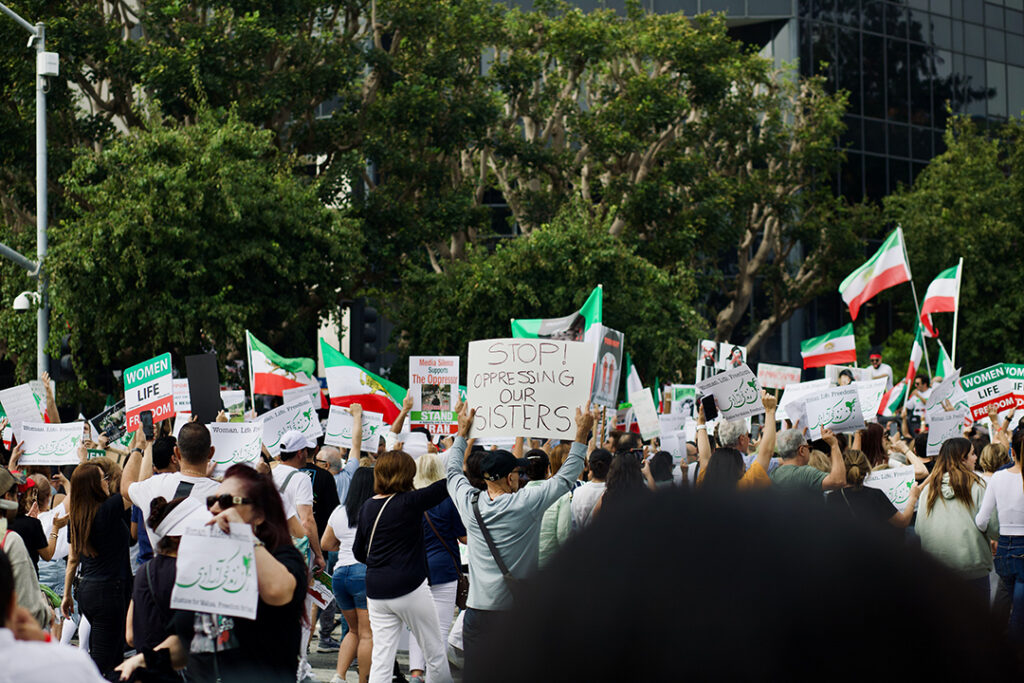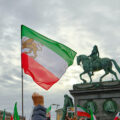Contradicting messages: Iranian protests and women’s freedom of expression in Europe
Contradicting messages: Iranian protests and women’s freedom of expression in Europe
Following protests, Europe has shown solidarity with Iranian women. Yet, some European nations give contradicting messages on religious women’s rights.
In September 2022, protests erupted in Iran in reaction to the death of Mahsa Amini, a 22-year-old Iranian woman. Mahsa died after being beaten by Iran’s morality police for wearing an “improper” hijab. This article is the second part of an article series on the impact of the Iranian protests in Europe. The first article looked at Europe’s response to the Iranian protests, on a local, governmental, and religious leadership level. This article will reflect on how the Iranian protests over women’s right to control their own bodies relate to the restrictions some European countries also put on Muslim women’s freedom of expression.
European societies and religious difference
Before outlining the contradicting messages of some European countries, it is important to briefly outline some theory regarding the debates surrounding the hijab and religious expression in Europe. Philosopher Iris Marion Young explained that many liberal, European societies privilege unity over difference. This means there is “there is no possibility of a hyphenated ethnic/national identity – one belongs either to a group or to a nation.”[1] Therefore, equality in society is achieved by making “one’s social, religious and ethnic origins irrelevant in the public sphere.”[2]
Based on this, for several European governments, the hijab has become seen as an affront to liberal values. This has led to an increasing crackdown on the expression of religious identity and a subsequent rise in discrimination cases and hate crimes against Muslim women.[3] Such restrictive and degrading measures have been referred to as the ‘othering’ of religious women. ‘Othering’ is a process by which the oppressed religious woman is constructed and the ‘othering’ of religious women “produces the western subject as the knower.”[4]
Europe’s reaction to the Iranian protests
Quite soon after protests began in Iran, many Europeans took to the streets in solidarity with the growing uprising. Women-led demonstrations took place in cities such as London, Paris, Rome, Stockholm, and Zurich.[5] European politicians have been unequivocal in their defence of women’s right to choose what to wear – as long as it relates to removing religious clothing. On the 6th October 2022, the European Parliament condemned Iran for the “repression of women’s rights protesters.”[6] A day before, Swedish MEP Abir Al-Sahlani cut her hair in the Strasbourg Parliament in a show of solidarity with Iranian women.[7] The Iraq-born MEP said “women, life, freedom” in Kurdish and English before cutting off her braid.
Such a statement demonstrates that the overwhelming European response has been one which champions Iranian women’s rights to express their identity. Moreover, the statements of European politicians suggest support for the removal of items, such as the hijab, which Europe interprets as symbolising the repressive Shia Islamic regime.
Contradicting messages
However, Europe’s stance and solidarity towards Iranian female protestors highlight a contradiction. Many of the European governments that support Iranian women’s right to freedom of expression deny their citizens this same choice. Politicians in these European countries do not defend the right of religious women to wear religious clothing, only not to.
In November 2022, the Austrian federal government stated that “human rights, especially women’s rights, as well as freedom of assembly and freedom of the press, must be respected.”[8] Yet, five years earlier, legislation was introduced that banned the niqab and burqa in public spaces in order to protect “Austrian values.”[9] Moreover, France showed its support for Iranian women’s freedoms when the words “Woman. Life. Freedom” were projected onto the Paris City Hall in January 2023.[10] Yet, at the same time, wearing overt symbols of religion in public institutions is illegal in France.[11] This means that Muslim women in France and Austria who would like the freedom to publicly express their identity are denied this right.
Perhaps because the Iranian protests and Europe’s response to them further reinforce the existing dichotomy between both countries, Iranian Muslim women and some European Muslim women’s right to freedom of expression are viewed differently. In Iran, the right to choose how you express yourself, religiously or not, is worth fighting for. In some European countries, this right is denied.
Moreover, through the contradicting messages of several European countries, it is clear that both Iranian and European Muslim women are being made the ‘Other’. Western, European countries are the knowers and have the power to either celebrate Iranian Muslim women’s right to express themselves freely or condemn European Muslim women’s same wish.
Want to learn more about similar topics? Go to the EARS Dashboard.
Sources
[1] Wallach Scott, J. (2007). The Politics of the Veil. Princeton: Princeton University Press. pg.11.
[2] Wallach Scott, J. (2007). The Politics of the Veil. Princeton: Princeton University Press. pg.11.
[3] Forgotten Women: The Impact of Islamophobia on Muslim women | European Website on Integration
[4] Scharff, C. (2011). Disarticulating feminism: Individualization, neoliberalism and the othering of ‘Muslim women’. European Journal of Women’s Studies. 18(2). Pp. 119–134
[5] ‘It’s a revolution’: Iranian women in UK believe protests will bring freedom | Iran | The Guardian
[6] EU Parliament slams Iran over repression of women’s rights protesters – POLITICO
[7] EU Parliament slams Iran over repression of women’s rights protesters – POLITICO \
[8] Austrian Parliament Calls for More Support for Protests in Iran – Vindobona.org | Vienna International News
[9] Austrian ban on full-face veil in public places comes into force – BBC News
[10] France backs Iran protests with rally, Eiffel Tower display for Mahsa Amini | The Times of Israel
[11] French move to extend ban on religious symbols sparks fears of ‘radical’ secularism






